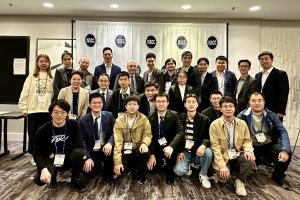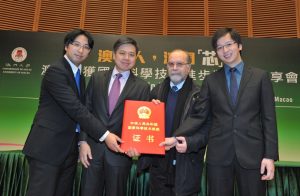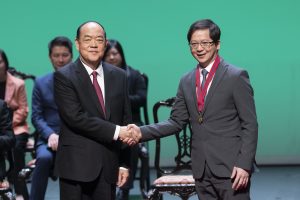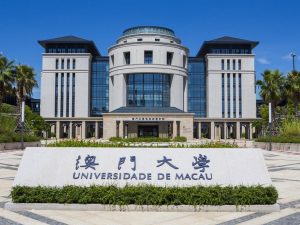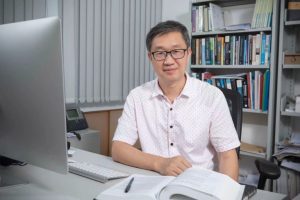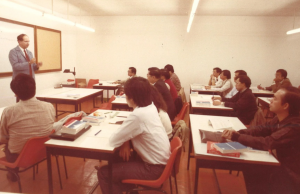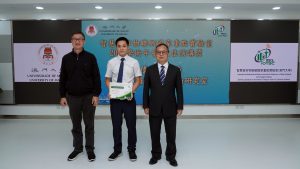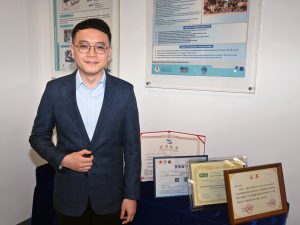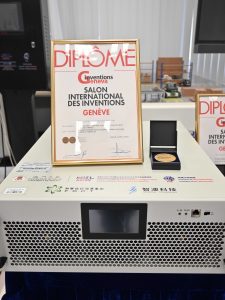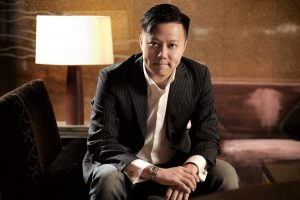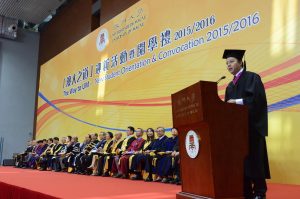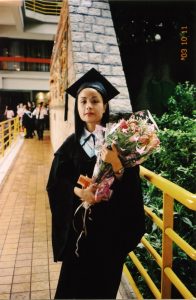In 1999, Macao returned to its motherland China, marking a pivotal moment that brought transformative changes to the city and unprecedented development opportunities for its people. The University of Macau (UM) was no exception. UM was poised to embark on a new historical era. As we celebrate the 25th anniversary of the handover, five UM members who have been with the university since 1999 share their stories and experiences that highlight the transformations of both UM and the Macao Special Administrative Region (SAR).
Establishing Macao’s reputation as a hub for chip research
This year, UM stood out at the 71st IEEE International Solid-State Circuits Conference, the world’s most prestigious academic conference in the field of electronics. UM scholars had a total of 14 papers accepted, positioning the university as the conference’s top contributor alongside South Korea’s Samsung. Mak Pui In, director of the UM State Key Laboratory of Analog and Mixed-Signal VLSI (SKL-AMSV) and deputy director of the Institute of Microelectronics, has been central to these achievements. Having dedicated 25 years to chip development and technological innovation at UM, Prof Mak has not only played a pivotal role in establishing Macao’s reputation as an international hub for chip research, but also witnessed the development of electronic engineering research at the university.
In 1999, Prof Mak started his undergraduate studies in the UM Department of Electrical and Computer Engineering. Due to his exceptional academic performance, Prof Mak was directly admitted to a PhD programme upon graduation. In 2003, when he started his PhD, his supervisor Prof Rui Martins founded the Microelectronics Laboratory. This laboratory was upgraded to a state key laboratory in 2011, and Prof Mak was involved in its development. Reflecting on his early days at UM, he says, ‘When I first arrived at the university, there was barely any electronic engineering research taking place. After Macao’s return to China, more resources were allocated to technological development, leading to continuous improvements in our laboratory’s environment.’
The research institute where Prof Mak works is now equipped with many advanced design workstations and much sophisticated testing equipment, providing strong hardware support for faculty and student research. Reflecting on the challenging conditions when the laboratory was first established, Prof Mak speaks emotionally, ‘The university repurposed a space from the parking lot in the old campus to build our laboratory. Due to its limited size, each research group had to take turns using the equipment. Despite these unfavourable conditions, our determination to pursue research remained strong.’
This determination was crucial in elevating UM’s chip research to an international standard. First receiving the Honorific Title—Merit from the Macao SAR Government in 2005, Prof Mak was also awarded the Medal of Merit—Education last month. The government’s commendations highlight several of Prof Mak’s achievements: his research ‘Two-Step Channel Selection for Wireless Receiver Front-Ends’ earned UM’s first US patent in microelectronics in 2009; his integrated circuit technology won a second prize of the State Scientific and Technological Progress Award in 2011, marking the first time Macao received this honour; and his project ‘Battery-less Intelligent Electronic Chips’ won the Tencent Xplorer Prize in 2022, making Prof Mak the first Macao scholar to receive this award. More significantly, beyond these research accomplishments, Prof Mak is deeply committed to education and is an exemplary model for his students.
Reflecting on the past 25 years, Prof Mak humbly attributes his contributions to Macao’s reputation as a chip research hub to the support from various sectors of society and the diligent efforts of his laboratory team. This reputation has also attracted students from all over the world to pursue chip research at UM. Prof Mak is confident that with the integrated development of Macao and Hengqin, UM will continue to serve as a crucial base for talent training as well as research and development. This role will enable more young people to realise their potential and contribute to the development of the country through science and technology.
Achieving research success together with scholars from around the world
Quality students and outstanding faculty are essential components of a good university. In the 2025 Times Higher Education World University Rankings, UM rose to the 180th position. ‘UM’s success today is not by chance, but the result of the sustained collaborative efforts of our faculty and staff,’ says Gong Zhiguo, professor in the UM Department of Computer and Information Science, who joined the university in 1999. Throughout these 25 years, Prof Gong has been committed to his role as a mentor for students. In the meantime, he takes pride in working with a team of researchers with international academic influence to make more academic and research achievements.
‘However, there was a time when UM struggled to attract good faculty,’ says Prof Gong, who moved to Macao with ambitious educational goals after earning his PhD from the Chinese Academy of Sciences in 1998. ‘When Macao returned to China, its economy was just modest, and both education and technology were just beginning to develop.’ Despite Macao’s initially slow development, Prof Gong was fond of this burgeoning city and believed that a new era was unfolding here. ‘At that time, UM was not very appealing to outstanding faculty from outside. Even when the university succeeded in hiring quality faculty, many of them would leave soon after.’ Prof Gong was among the few faculty members who remained committed to their roles at UM, and his dedication paid off, thanks to the advantages of the ‘one country, two systems’ policy. With the support of the central and the Macao SAR governments, UM has secured several significant historical development opportunities. The university’s teaching and research capabilities have improved substantially, significantly enhancing its appeal to outstanding faculty. Later, with the revision of the university charter, UM gained greater autonomy, which further improved conditions for recruiting top-tier academics from around the world. Today, new outstanding scholars join the university every year.
A good teacher is like a beacon, illuminating their students’ paths. As UM began to attract more high-quality faculty, its strength and reputation grew, making it more appealing to prospective students. Prof Gong notes that UM has established a new research strategy and has made significant improvements across various fields, quickly emerging as a notable institution. This transformation has positioned UM as an attractive destination for postgraduate students. Prof Gong, who is involved in student recruitment, has observed a remarkable shift in the university’s recruitment dynamics. ‘When I went to universities in Shanghai to recruit students more than ten years ago, many students had never heard of UM. But the situation has fundamentally changed. Now, we receive applications every year from graduates of top universities around the world. They are eager to further their studies at UM.’
Prof Gong believes that UM’s research strategy closely aligns with the overall development of the country and addresses Macao’s development needs. The university also closely follows contemporary digital trends and enjoys broad development prospects. Established in 2018, the State Key Laboratory of Internet of Things for Smart City (SKL-IOTSC) serves as UM’s platform for conducting cutting-edge AI research. As one of the founding members of SKL-IOTSC, Prof Gong stresses that the establishment of the laboratory has not only expanded the university’s research capabilities, but also played a key role in attracting and retaining high-calibre talent in Macao. He says, ‘The strong faculty team at UM and our continuously improving research strength mutually enhance each other, propelling the university to new heights in scientific and technological innovation.’
Driving Macao’s development through scientific and technological innovation
For Macao, diversifying its economy is essential, and developing the high-tech industry is a key strategy to achieve this goal. Recognising the importance of commercialising research results to the development of the high-tech sector, UM has established a one-stop service platform to support faculty and students in bringing their technological inventions to the market. In recent years, UM has successfully incubated many technology start-ups. Among them is Smarmac Technology Company Limited established by local UM doctoral graduates. The company is committed to industrialising its advanced power electronic systems, including a power quality compensator with advanced control technology and an efficient smart wireless charging system, for various applications. Lam Chi Seng, associate professor in the Institute of Microelectronics, SKL-AMSV, and the Department of Electrical and Computer Engineering in the Faculty of Science and Technology, is a key player in the company.
Prof Lam, who started his studies at UM in 1999, humorously notes that the idea of industry-academia collaboration felt like pie in the sky 25 years ago. ‘Back then, it seemed like a pure fantasy to think that I could one day achieve something significant with my colleagues and students through technological innovation,’ he shares. Despite these doubts, Prof Lam made an important decision after completing his master’s degree at UM—he resigned from his administrative position at the university’s Campus Development and Engineering Sector and gave up a promotion opportunity. ‘I wanted to challenge myself, so I decided to pursue a PhD in electrical and electronics engineering at UM,’ he explains. This decision took a considerable amount of determination and courage.
Prof Lam has realised his commitment to an academic and research career. Dedicated to his goal of improving life quality through technology, Prof Lam and his team have developed several groundbreaking technologies. These include a low-cost and low-loss power quality compensator with advanced control technology, which has earned multiple patents and won the gold award at the 48th Geneva International Exhibition of Inventions; and an efficient dynamic wireless charging system to which Prof Lam has dedicated his efforts in recent years. The applications of the wireless charging system are extensive. For example, the system enables unmanned ships to operate without the need for manual battery replacement or wired charging, thus saving human resources. Similarly, in smart logistics warehouses, the ability to continuously charge automatic guided vehicles around the clock while they are in operation can significantly enhance logistics efficiency. Recognising the transformative potential of these technologies, Prof Lam, with the support of the UM Centre for Innovation and Entrepreneurship, helped his students establish Smarmac Technology Company Limited. By designing and developing advanced power electronic systems specifically for enterprises, the company has successfully transformed research results into practical applications.
Reflecting on his journey, Prof Lam expresses gratitude for the strong support the country has provided to Macao, as well as the backing from the Macao SAR Government and UM, which has enabled researchers like him to pursue their dreams. He is also thankful to his PhD supervisor Han Ying Duo, whose guidance and mentorship played an instrumental role in his development and research career. Prof Lam believes that the rapid development of science and technology in Macao since the handover has not only led to remarkable research results with promising applications, but also created opportunities for students to realise their research ambitions and become drivers of future industry-academia collaboration.
Breaking the ‘predestined fate’ of Macao music
Back in 1999, the idea of making a living through music seemed like chasing a foolish dream. However, UM gave students the courage to persist in pursuing their dreams. Jones Chong Cho Lam, founder of Chessman Entertainment Production Co Ltd and a UM alumnus, began his music journey at UM. Jones started his studies in the Department of Chinese Language and Literature in 1999. His UM journey empowered him to face challenges fearlessly. With an adventurous spirit, Jones and his like-minded peers founded Chessman to challenge the ‘predestined fate’ of Macao music and artists.
During his time at UM, Jones not only focused on his studies, but also dedicated his spare time to organising music events with fellow enthusiasts. One such event was a songwriting contest that became instrumental in promoting local music culture. As Jones gained more experience in organising music events, a bold vision formed in his mind: ‘If I can work full-time as a coordinator and producer of different entertainment shows after graduation, my life will become more colourful.’
Jones began laying the groundwork to realise this vision. He founded Chessman during his second year at UM. The name of the company symbolises the idea that life is like a chess game, and destiny is in one’s own hands. Now, after 23 years in the cultural and entertainment industries, Jones not only owns a professional recording studio and supports local music production, but has also organised numerous large-scale concert tours. These efforts have helped integrate the concert economy into Macao’s broader event economy, supporting its development as a ‘city of performing arts’.
Reflecting on his journey, Jones expresses gratitude for the opportunity to grow together with UM and Macao. He says, ‘If UM hadn’t provided such a nurturing environment during those four years, which allowed us to develop our strengths, we might not have had the courage to start a business. I am grateful for the education I received at UM, which enabled us to witness the transformation of Macao’s music industry from virtually non-existent to vibrant. Before the handover, there was barely any local music; now, with over 100 full-time artists, Macao has become an essential stop for world-class singers on global world concert tours.’
Unwavering commitment to education
In today’s Macao, where material wealth is relatively abundant, scholarships primarily serve to show appreciation and encouragement. However, 25 years ago, the same scholarships were life-changing events for economically disadvantaged students. Vivien Chan Nga Man, a UM alumna who started her English education studies at the university in 1999, exemplifies this impact. Since graduation, Vivien has dedicated her career to nurturing talent for Macao. Now serving as the vice dean of the secondary English section of Colégio Diocesano de São José 5, Vivien remains grateful to UM: ‘I was able to attend university thanks to the scholarship. Otherwise, my life would have been completely different.’
Vivien recalls that in the early days following the handover, investment in Macao’s education sector was relatively limited, and university education was less accessible than it is today. ‘Due to financial constraints, my family could not afford my university tuition. Fortunately, UM awarded me a scholarship to support my studies,’ she shares. Vivien is also grateful to the professors she met at UM. ‘The faculty in the English education programme were exceptional. They provided excellent care and guidance, especially for students like me who had weaker backgrounds in literature. This support laid a solid foundation for my subsequent career teaching English literature,’ she adds.
Having transformed from a fledgling young teacher to an experienced educator, Vivien remains committed to the core roles of a teacher: teaching, inspiring and enlightening students. She attributes this dedication to the influence of her UM mentors, who demonstrated the profound impact a teacher can have on students. This year, Vivien was awarded a full scholarship by the Bureau of Educational and Cultural Affairs of the US Department of State to participate in a training programme for secondary school educators in the US. With the knowledge and skills acquired from the programme, she plans to inject fresh momentum into the innovation and development of English education in Macao.
Born and raised in Macao, Vivien has dedicated 21 years to her teaching career and has witnessed the significant improvements in the quality of education in Macao since the handover. She shares, ‘I feel fortunate to have witnessed and have been a part of this historical shift.’ Vivien is committed to continuing her contributions to education. She aims to pass on her knowledge and experience to both students and young teachers, thereby upholding her responsibilities as an educator.
Embracing new development opportunities
As we celebrate the 25th anniversary of Macao’s return to the motherland, UM is seizing new development opportunities. This month marked the official commencement of the construction of the UM campus in the Guangdong-Macao In-Depth Cooperation Zone in Hengqin. With this expansion, UM becomes the first higher education institution in Macao to extend its teaching and research activities to the Cooperation Zone, opening a new chapter in the development of Macao’s international higher education. Looking forward, UM faculty and students will capitalise on this historic opportunity. By leveraging the coordinated development of Macao and Hengqin, the university aims to establish itself as a high-quality base for research and innovation, as well as a hub for international and high-calibre talent.
